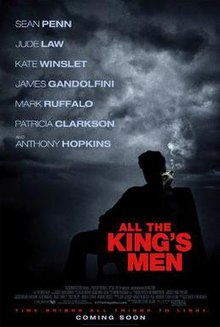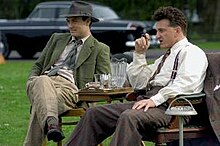All the King's Men (2006 film)
| All the King's Men | |
|---|---|
 Promotional poster | |
| Directed by | Steven Zaillian |
| Written by | Steven Zaillian Robert Penn Warren |
| Produced by | Ken Lemberger Mike Medavoy Arnold Messer Steven Zaillian |
| Starring | Sean Penn Jude Law Kate Winslet James Gandolfini Mark Ruffalo Patricia Clarkson Jackie Earle Haley Anthony Hopkins |
| Cinematography | Paweł Edelman |
| Edited by | Wayne Wahrman |
| Music by | James Horner |
Production company | |
| Distributed by | Columbia Pictures |
Release date | September 22, 2006 |
Running time | 125 minutes |
| Country | United States |
| Language | English |
| Budget | $55 million |
| Box office | $9,450,897 |
All the King's Men is a 2006 film adaptation of the 1946 Pulitzer Prize-winning novel All the King's Men by Robert Penn Warren. It was directed by Steven Zaillian, who also produced and scripted.
The story is about the life of Willie Stark (played by Sean Penn), a fictional character resembling Louisiana governor Huey Long. The film co-stars Jude Law, Kate Winslet, Anthony Hopkins, James Gandolfini, Mark Ruffalo, Patricia Clarkson and Jackie Earle Haley.
All the King's Men had previously been adapted by Robert Rossen in 1949. Although it does not follow the 1949 film's narrative and is more faithful to the novel than the earlier movie, the 2006 film is often considered a remake of the 1949 version. According to IMDb, Zaillian never saw the original film, and adapted the screenplay solely from Warren's novel.
Filming took place in New Orleans, Morgan City, Donaldsonville, at the Louisiana State Capitol in Baton Rouge and many other places in Louisiana.
The world premiere was held at the Toronto Film Festival[1] on September 11, 2006. There the film was first screened to the press. A special screening was held at the Tulane University in New Orleans on September 16, 2006.
Plot
Louisiana newspaper reporter Jack Burden takes a personal interest in Willie Stark, an idealistic small-town lawyer. Circumstances develop that result in Stark's being urged to run for governor by a local political leader, Tiny Duffy. Jack has been raised around politics. He is the former lover of Anne Stanton, whose father was once governor. Jack was raised by Judge Irwin, his stepfather, an honorable man.
In time, Jack and political strategist Sadie Burke reveal to Stark that he is actually a dupe in the governor's race, expected to split the vote, spout the party line and lose. This opens his eyes to the realities of politics, and he vows not to be fooled again. He defies Duffy publicly and begins to give speeches with straightforward talk that the public appreciates. He becomes governor in the next election, using any means necessary. Duffy now works for him as lieutenant governor. He also has a silent, menacing driver and bodyguard called Sugar Boy. Finally, he encourages Jack to come work for him as an adviser.
Judge Irwin disapproves, seeing Stark as an opportunist. Anne Stanton seems to agree and so does her brother, Dr. Adam Stanton. Willie Stark is a persuasive man, however, and knows how to get his way. He has a pet project, building a new hospital, and convinces Dr. Stanton to run it for him. He also begins an affair with Anne Stanton, provoking Sadie's jealousy and Jack's disappointment.
Criticized publicly by Judge Irwin and embroiled in increasing political controversy, Stark demands that Jack dig up dirt on the judge to be used against him. Jack insists that no such dirt exists, but he does manage to uncover the fact that many years ago, Judge Irwin accepted a bribe. Following this revelation, the judge commits suicide.
Stark has now come to embrace various forms of corruption and uses patronage and intimidation to get his way. Dr. Stanton is told that the hospital is a front for the governor's own personal and political gain (though Anne and Jack comment that this is not the case), and finds out about Stark's relationship with his sister. He lies in wait at the state capitol, and assassinates Stark, but is then shot and killed by Stark`s bodyguard.
Cast
| Actor | Role |
|---|---|
| Sean Penn | Willie Stark |
| Jude Law | Jack Burden |
| Kate Winslet | Anne Stanton |
| Anthony Hopkins | Judge Irwin |
| James Gandolfini | Tiny Duffy |
| Patricia Clarkson | Sadie Burke |
| Mark Ruffalo | Adam Stanton |
| Kathy Baker | Mrs. Burden |
| Travis Champagne | Tom Stark |
| Jackie Earle Haley | Roderick "Sugar Boy" Ellis |
| Connor Fux | Tennis Boy |
| Montgomery John | Adam Stanton, Age 11 |
Reception

The film was a failure both with critics and at the box office, in spite of its high-profile cast, direction, and production team. Few critics endorsed it, although it did garner strong Oscar "buzz" before its initial opening.[2]
Rotten Tomatoes gives a rating of 11% "Rotten" based on 153 reviews with a consensus stating "With its star-studded cast and hallowed source material (the novel of the same name won the Pulitzer Prize, and the 1949 original film took home a best picture Oscar), All the King's Men has the pedigree of a prestige picture. Don't be fooled. With a scenery-chewing performance from Sean Penn, an absence of political insight, and an overall lack of narrative cohesiveness, Men gives Oscar bait a bad name."
Entertainment Weekly in its August 18, 2006 issue included All the King's Men in its Oscar Preview and said the film was most likely to win an Oscar. The article concluded the only reason for the film not to win an Oscar was its delayed opening (the film was originally to be opened in 2005).
Richard Schickel (Time Magazine) liked the movie, arguing that "it's much more faithful to the tone of the novel" than the original.[3]
Kenneth Turan (Los Angeles Times) praised the film's "undeniable moral seriousness" and the actors' "exceptional ensemble work." He argued that Zaillian's script and direction "expertly extracted the core of this greatest of American political novels, a work that is both of its time and outside it."[4]
A. O. Scott (New York Times) expressed disappointment with the film: "Nothing in the picture works. It is both overwrought and tedious, its complicated narrative bogging down in lyrical voiceover, long flashbacks and endless expository conversations between people speaking radically incompatible accents."[5]
Michael Medved gave All the King's Men two stars (out of four) calling it "depressing and disappointing", a "stodgy melodrama" and a "pointless, pretentious, plodding period-piece".[6]
Recently, the film was featured in Nathan Rabin's ongoing blog feature for The Onion's A.V. Club, "My Year of Flops". Of three categories (failure, fiasco, or secret success), he labeled All the King's Men as a failure and said of the film: "Zaillian’s dud manages the formidable feat of being at once histrionic and agonizingly dull, hysterically over-the-top yet strangely lifeless."[7]
Zaillian was clearly stunned by the poor critical and box-office results of this film, which opened with only $3.8 million and barely made $7.2 million at the end of its run in US theaters. The weekend's other new wide release, Jackass Number Two, made $28.1 million.
In an interview with the Los Angeles Times, Zaillian said that the film's poor performance was "like getting hit by a truck. ... I don't know what to make of it."[8]
Differences between the book and the screenplay

- The film (with the exception of flashbacks) is set during the early 1950s. The book is set during the Great Depression.
- In the movie, Stark wins the first gubernatorial election he enters. In the book, Stark pulls out of the original election after learning why he had been asked to run. He instead supports MacMurfee. However, in the next election, Stark defeats MacMurfee to become governor.
- Jack’s doctoral research storyline is not in the film. His research was about Cass Mastern, an ancestor who lived in the Antebellum South and fought in the American Civil War. The book devotes an extensive passage to the story of Mastern and the way in which he unwittingly and drastically influences the lives of others, which many critics have argued serves as the novel's moral center. Jack walks away from his study of Mastern because he is unwilling to accept the way in which people's actions influence the fates of others.
- The whole storyline in the book involving Tom Stark is removed. He is only seen a few times in the film. In the book Tom impregnates a girl, which threatens his father with a huge scandal (A scene to this effect is included on the DVD). His father wants to whitewash the situation by bribing the girl’s family. Shortly afterwards, Tom is seriously injured during a college football game. After an unsuccessful surgery performed by Adam Stanton and a revered spinal doctor, Tom becomes a vegetable, eventually dying shortly after his father’s assassination.
- The film ends a few minutes after Willie Stark’s assassination, explaining little (through newspaper headlines) about what takes place after the event. In the book, Jack Burden explains many things that take place after the assassination, which includes Tom’s death. By chance, Jack encounters Sugar Boy at a library and barely resists the temptation to coax him into assassinating Tiny Duffy to avenge Willie's death (a scene to this effect is included on the DVD). Jack also reveals that he and Anne got married. In addition, Jack returns to his study of Cass Mastern, now prepared to cope with "the awful responsibility of time." Also, Lucy Stark adopts Tom's child.
Soundtrack
| Untitled | |
|---|---|
| Review scores | |
|---|---|
| Source | Rating |
| Filmtracks | |
| Movie Music UK | |
| Movie Wave | |
| ScoreNotes | |
| SoundtrackNet | |
Track listing
- Main Title - 4:30
- Time Brings All Things to Light - 1:45
- Give Me the Hammer and I'll NAIL 'EM UP! - 5:59
- Bring Down the Lion and the Rest of the Jungle Will Quake in Fear - 3:34
- Conjuring the 'Hick' Vote - 3:14
- Anne's Memories - 2:47
- Adam's World - 3:43
- Jack's Childhood - 2:22
- The Rise to Power - 3:17
- Love's Betrayal - 2:54
- Only Faded Pictures - 2:49
- As We Were Children Once - 2:49
- Verdict and Punishment - 6:00
- All Our Lives Collilde - 3:23
- Time Brings All Things to Light... I Trust It So - 7:36
See also
References
- ^ "2006 TIFF Archive".
- ^ Rotten Tomatoes. "American reviews of 'All the King's Men'". Rotten Tomatoes. Retrieved 2006-12-24.
- ^ Richard Schickel (2006-09-10). "He Had a Great Fall". Time. Retrieved 2006-12-10.
- ^ Kenneth Turan (2006-09-22). "'All the King's Men'". Log Angeles Times. Archived from the original on 2007-01-02. Retrieved 2006-12-10.
- ^ A.O. Scott (2006-09-22). "Southern Fried Demagogue and His Lurid Downfall". NY Times. Retrieved 2006-12-10.
- ^ Michael Medved. "All The King's Men". MichaelMedved.com. Retrieved 2006-12-10.
- ^ Nathan Rabin (2007-02-15). "My Year Of Flops: CaseFile #7: All The King's Men". The A.V. Club. Retrieved 2007-03-07.
- ^ L.A. Times (2006-10-03). "Extract of the interview with the L.A. Times". Los Angeles Times. Retrieved 2006-12-30.
External links
- Official website
- All the King's Men at IMDb
- All the King's Men at AllMovie
- All the King's Men at Rotten Tomatoes
- All the King's Men at Metacritic
- All the King's Men at Box Office Mojo
- Soundtrack Album Information
- A 'First Listen' of James Horner's soundtrack
- Footage from James Horner's scoring session
